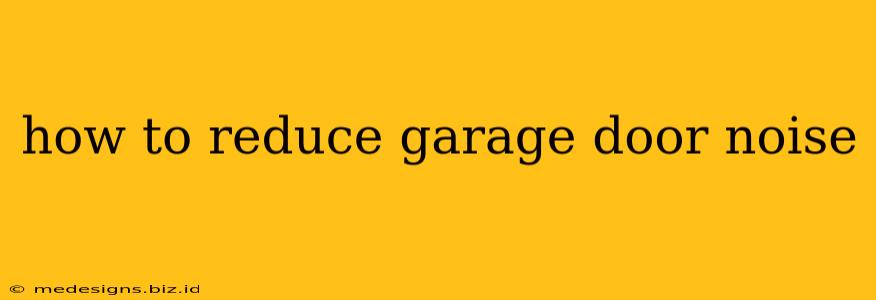A noisy garage door can be incredibly frustrating, disrupting your peace and quiet, especially at night. Fortunately, there are several ways to tackle this common problem, ranging from simple DIY fixes to more involved repairs. This guide will walk you through the most effective methods to significantly reduce the noise coming from your garage door.
Identifying the Source of the Noise
Before diving into solutions, it's crucial to pinpoint the source of the noise. This will help you target your efforts effectively and avoid unnecessary work. Common culprits include:
-
Roller Problems: Worn, damaged, or misaligned rollers are a frequent cause of squeaking, grinding, or rattling. Check for cracks, flat spots, or significant wear on the rollers themselves. Misalignment can also cause excessive friction and noise.
-
Track Issues: Bent, rusty, or otherwise damaged tracks can cause the door to bind and create loud noises as it moves. Inspect the tracks for any obstructions, dents, or rust build-up.
-
Spring Problems: Garage door springs are under immense tension. Worn or broken springs can lead to loud banging or snapping noises. Never attempt to repair or replace garage door springs yourself unless you have extensive experience. This is a dangerous task best left to professionals.
-
Hinges: Loose, rusty, or damaged hinges contribute to squeaking and creaking noises. Check each hinge for tightness and lubrication needs.
-
Hardware: Other hardware components, such as the opener and its connecting parts, can also produce noise. Examine all connections for looseness or damage.
Simple Solutions for Quieter Operation
For many noise issues, some straightforward fixes can make a significant difference:
1. Lubrication: The Silent Solution
Applying lubrication to moving parts is the easiest and often most effective solution. Use a silicone-based lubricant (avoid WD-40 as it attracts dirt) and generously lubricate:
- Rollers: Apply lubricant to the roller wheels and the track they run on.
- Hinges: Lubricate the hinge pins and the hinge surfaces.
- Track: Spray lubricant along the track, paying attention to the areas where the rollers make contact.
After lubrication, operate the door several times to distribute the lubricant.
2. Tighten Loose Hardware
Check all the bolts and screws securing the rollers, hinges, and track to the door and frame. Tighten any loose fasteners to eliminate rattling and squeaking.
3. Clean the Tracks
Dirt, debris, and rust build-up in the tracks can cause friction and noise. Use a wire brush or shop vacuum to clean the tracks thoroughly.
More Involved Solutions
If simple lubrication and tightening don't solve the problem, more significant repairs might be necessary:
1. Roller Replacement: Smooth Rolling Action
Worn or damaged rollers are a major source of garage door noise. Replacing them is relatively straightforward, but it's essential to purchase rollers that are compatible with your door's type and weight.
2. Track Repair or Replacement: Straightening the Path
Bent or damaged tracks require repair or replacement. Minor bends might be correctable with careful adjustment, but severely damaged tracks usually need replacing for optimal operation and quiet performance.
3. Spring Repair or Replacement: Professional Help Needed
As previously mentioned, never attempt to repair or replace garage door springs yourself. These springs are under extreme tension and pose a serious safety risk. Contact a professional garage door technician for this type of repair.
4. Garage Door Opener Adjustments
Sometimes, the garage door opener itself can contribute to noise. Check its settings and make any necessary adjustments to ensure smooth and quiet operation. This may involve adjusting the force and speed settings.
Prevention is Key: Regular Maintenance
Regular maintenance is the best way to prevent excessive garage door noise. At least once a year, inspect your garage door system thoroughly, lubricate moving parts, and tighten loose hardware. This proactive approach can save you time, money, and a lot of unwanted noise.
By following these steps, you can significantly reduce the noise coming from your garage door, restoring peace and quiet to your home. Remember that if you're uncomfortable tackling any repairs yourself, especially those involving springs, it's always best to call a qualified garage door professional.
